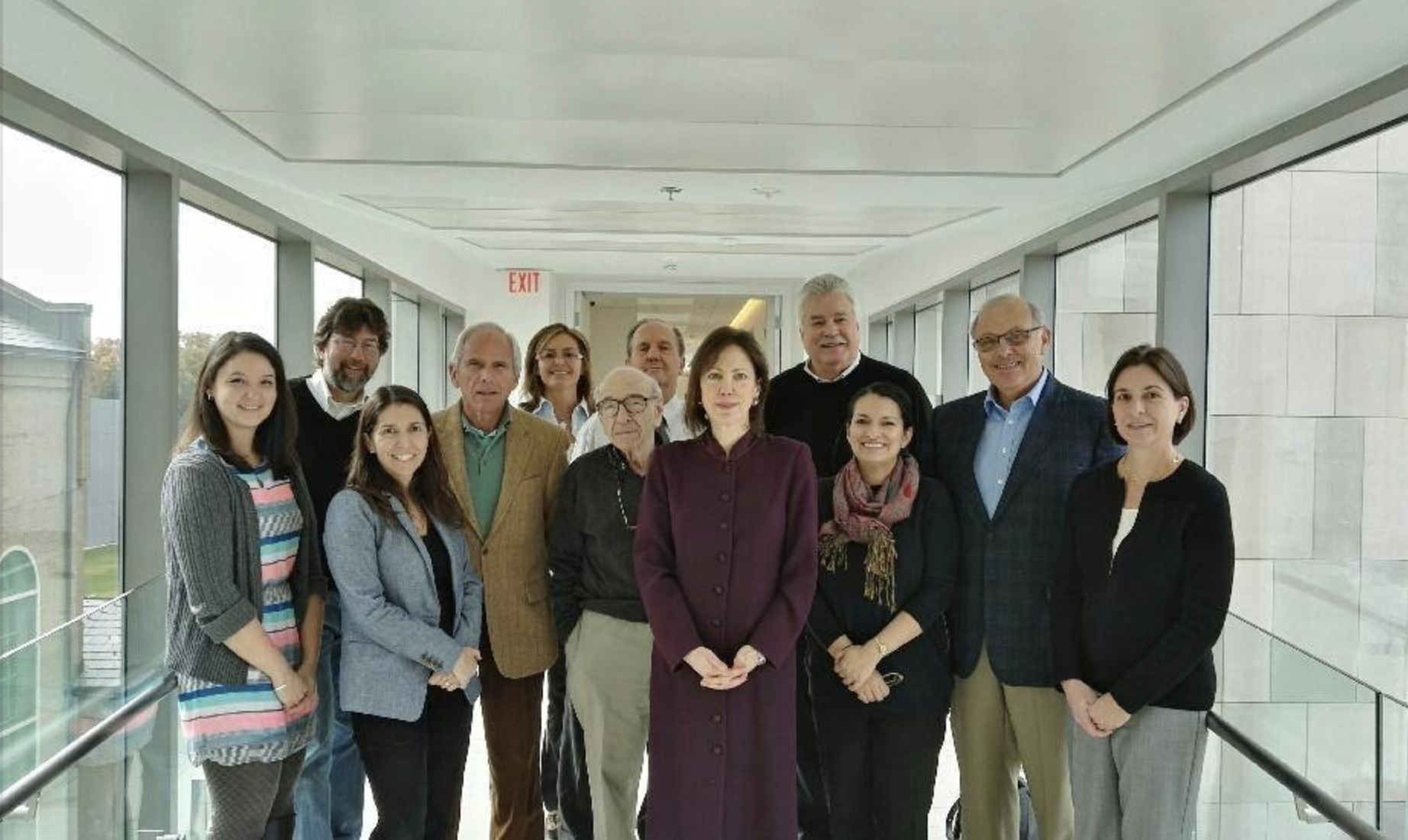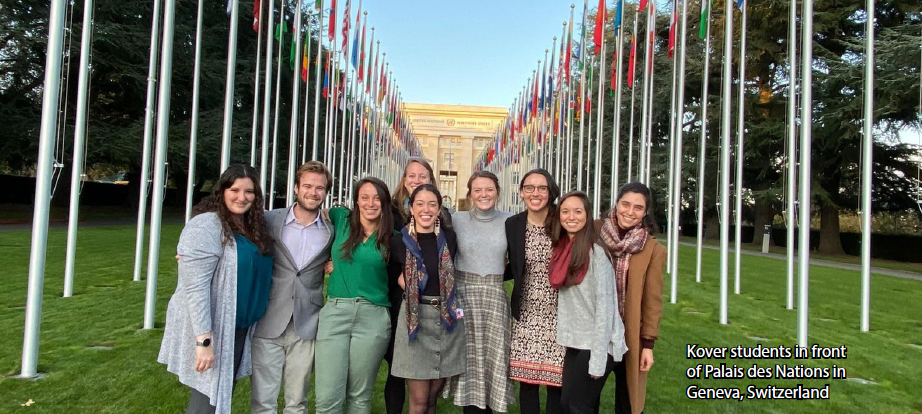The Center for Human Rights & Humanitarian Law Celebrating 30 Years of Shaping International Human Rights Protection

Contributions to the Inter-American System of Human Rights
The Center has helped shape the standards, practices, and jurisprudence of the Inter-American Human Rights System. Since its founding, freedom of expression has been a pillar of the Center’s litigation work at the regional level, spearheaded by faculty expert Professor Claudio Grossman. Examples of successful litigation on freedom of expression include the cases of Ivcher Bronstein v. Peru (2001) and Horacio Verbitsky et. al. v. Argentina (2004). These landmark cases have helped to develop and solidify a cohesive and protective jurisprudence around freedom of expression for the hemisphere.
Building on its success in advancing protections for freedom of expression in the Americas, the Center’s impact litigation work at the regional level later expanded to cases related to reparations, and torture and impunity for gender-based violence, sexual orientation and gender identity, and due process violations, among others. In 2003, the Center’s Impact Litigation Project (ILP) supported plaintiffs in Lorenzo Enrique Copello Castillo y Otros (Cuba), challenging Cuba’s summary execution system, in which the Inter-American Commission on Human Rights issued a sweeping reaffirmation of Cuba’s international human rights obligations and, for the first time in its proceedings, issued detailed recommendations for reparations. In the case of Uso?n Rami?rez v. Venezuela (2009), the Inter-American Court of Human Rights set specific guidelines for how to balance the protection of military forces and freedom of expression, siding with many of the arguments set forth by the ILP team. In 2018, the Center supported expert testimony in the groundbreaking case of Linda Loaiza v. Venezuela, the first time an international court of human rights (Inter-American Court of Human Rights) recognized that violence against a woman committed at the hands of an individual may amount to torture.
In recent years, the Center’s work at the regional level has expanded beyond litigation to include efforts to strengthen transparency and improve the nomination and election processes for judges and commissioners to the Inter-American Human Rights System. Since 2017, the Center has served as the Secretariat for Panels of Independent Experts who evaluate the qualifications of candidates applying to serves as commissioners and judges. The Organization of American States subsequently passed landmark resolutions—most notably, AG/RES.2908 (XLVII-O/17), AG/RES.2997 (XLVI-O/16)—rooted in a number of the panels’ recommendations calling for gender parity, enhanced racial and ethnic diversity, and increased civil society engagement in nomination and election processes. This work has also inspired change for national courts: in El Salvador, an independent panel of experts recently evaluated the candidates for the Constitutional Chamber of the Supreme Court.

Standards Setting within the United Nations System
Over the years, the Center has been involved in the development of new standards in the international legal framework addressing the prohibition of torture and other ill-treatment. For example, in 2012, the Center’s Kovler Project Against Torture assisted the UN Committee against Torture in the preparation of General Comment No. 3, which explains and clarifies the content and scope of State party obligations under Article 14 of the Convention against Torture and Other Cruel, Inhuman or Degrading Treatment or Punishment. General Comment No. 3 has been widely recognized as a benchmark authoritative interpretation of Article 14 and a critical tool for assisting stakeholders working to ensure full reparation to victims of torture.
The Center has also played a leading role in the development of three landmark international law instruments through its renowned Anti-Torture Initiative. Expert faculty and staff were instrumental in the 2015 Revision of the UN Standard Minimum Rules for the Treatment of Prisoners. Now known as the Nelson Mandela Rules, this instrument is one of the most authoritative soft law documents on the rights of persons deprived of liberty, and the revision constituted an important victory for advancing the human rights of prisoners worldwide. In 2018, the Center continued to focus efforts on the fight against impunity for acts of torture by supporting Professor Juan Méndez in his role as the Primary Drafter of the chapter on the Relevant International Legal Norms and Standards for the Revised Istanbul Protocol, which updates legal standards and jurisprudence relevant to the Manual on the Effective Investigation and Documentation of Torture and other Cruel, Inhumane or Degrading Treatment or Punishment (2004). At present, the ATI is one of three institutional partners responsible for coordinating the development of and advocacy around the forthcoming Principles on Effective Interviewing for Investigations and Information Gathering, which provides guidance to authorities on how to conduct effective interviews for information gathering during investigations and implement fundamental safeguards more effectively, while preventing torture and other forms of ill-treatment and respecting the human dignity of all persons.
Domestic Application of International Law
The Center’s impact litigation work has contributed to cases in domestic courts throughout Latin America that have been instrumental in advancing the rights of LGBT families across the region. This includes, most notably, an amicus brief submitted to the Supreme Court of Yucatan (Mexico) on the issue of marriage equality (2014) and an amicus brief submitted to the Constitutional Court of Colombia providing international law arguments in support of the constitutionality of same-sex couples’ second parent adoption (2015). The Center’s anti-torture work has contributed to multiple landmark cases in domestic courts in the U.S. and Canada that have sought to limit or eliminate the use of solitary confinement. This includes submitting legal interventions in key solitary confinement cases in the U.S., including a federal class action lawsuit, Ashker v. Brown (2012), which resulted in the end of indeterminate, long-term solitary confinement in California state prisons. Expert faculty and staff also supported the plaintiff in Shoatz v. Wetzel (2016), which resulted in Shoatz’s release from solitary confinement into the general prison population and ultimately helped to reshape solitary confinement practices in the Pennsylvania Department of Corrections. Most recently, in Canada, the ATI presented expert testimony in four landmark cases in Canada, successfully challenging federal rules on solitary confinement, with historic verdicts in Reddock v. Canada (2019) and Canadian Civil Liberties Assn v. Canada (2019). The Center also seeks to meaningfully impact issues beyond its traditional expertise in freedom of expression, LGBT rights, and anti-torture. In 2020, the Center contributed to a groundbreaking case before the Constitutional Court of Colombia, Sebastián Lanz Sánchez López et Al. v. Colombia, which redefined national protections for the rights of persons experiencing homelessness.
Evolving Approaches to Litigation and Advocacy
The Center’s work in litigation and advocacy continues to evolve and expand amid ongoing and emerging challenges to human rights. For example, in 2020, the Center was involved in a case before the Constitutional Court of Colombia on the issue of the right for all women to access legal abortion. Among recent cases, the Center has represented victims in cases against Panama, Chile, Paraguay, and Colombia. It has also submitted amicus briefs to the Inter-American Court of Human Rights and legal briefs to strengthen different advisory opinions. In 2021, expert faculty and staff submitted two briefs to the Inter-American Court on Human Rights, as part of the Court’s consultative process on differentiated approaches to persons deprived of liberty—one regarding deliberations on an advisory opinion on differentiated treatment of incarcerated persons, with a particular focus on women and LGBTI individuals in the region, and another focusing on international standards for pregnant women and primary care for women deprived of liberty. Advisory opinions involving these issues are expected in the coming year. Additionally, beginning in 2021, the Center’s anti-torture work has shifted toward strengthening justice and accountability efforts in Mexico related to enforced disappearances. This includes targeted litigation efforts supporting the Office of the Prosecutor in the preparation of amicus curiae and other materials on the applicable international norms and relevant jurisprudence to be used in the seminal Ayotzinapa case, which involved the disappearance of 43 students from the Ayotzinapa Rural Teachers' College.
***About the Center for Human Rights & Humanitarian Law
The Center advances the university’s broader mission by championing a holistic teaching, research, and advocacy agenda. Our exciting innovations in education and teaching promote widespread understanding of human rights beyond the traditional law school curriculum. Our efforts in research and scholarship support theoretical and applied research that investigates and models ways to promote, protect, and defend human rights. Our activities in litigation and advocacy seek to strengthen the rule of law and provide a foundation for access to justice that helps defend and safeguard human rights around the world. All Center programming promotes the value of service, thereby grounding the Center as a core resource for international organizations, governments, and the NGO community, and as a bridge between academia and civil society. Learn more at www.WCLCenterforHR.org.